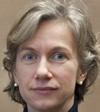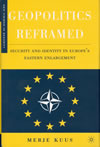Introducing Merje Kuus
 Merje Kuus is Associate Professor of Geography at the University of British Columbia in Vancouver, Canada. Her work analyzes the production of foreign policy expertise in today’s European Union. Dr. Kuus has also written on state sovereignty, critical geopolitics, foreign policy professionals, and the idea of Europe.
Merje Kuus is Associate Professor of Geography at the University of British Columbia in Vancouver, Canada. Her work analyzes the production of foreign policy expertise in today’s European Union. Dr. Kuus has also written on state sovereignty, critical geopolitics, foreign policy professionals, and the idea of Europe.
Furthermore, she is the author of “Geopolitics Reframed: Security and Identity in Europe’s Eastern Enlargement” (Palgrave Macmillan, 2007) as well as numerous articles in geographic, international relations, and European studies journals. Finally, dr. Kuus serves as a review editor of the journal Geopolitics and a co-editor of the book series Critical Geopolitics at Ashgate.
Geopolitical Passport
Your relationship with geopolitics
At what age did you discover geopolitics and what attracted you to it?
In primary school, one of my favourite pastimes was to watch a 30-minute television program on foreign affairs every Monday. This was Soviet Estonia of the late-1970s.
A figure that particularly fascinated me in those days was Valery Giscard d’Estaing. Why? I thought that his name was cool and exotic!
My dissertation was on urban regeneration, but I switched to political geography after two things happened shortly after my PhD defence.
One was reading David Campbell’s “Writing Security”, a brilliant book. The other was receiving post-doctoral research grants from the United States Institute of Peace and the John D and Catherine T. MacArthur Foundation. Without those grants, I would not be in academia today.
Which geopolitical topics have your focus and why did you choose especially these?
Most of my work to-date focuses empirically on the production of identity and security in Central Europe. The question that underpins that work and propels my research to this day concerns the intellectual and social apparatus of knowledge production.
My current work investigates the ways in which geopolitical concepts are crafted and operationalized inside foreign policy bureaucracies. The empirical case is Europe again, but I use today’s European Union to investigate broader questions around political geographies of knowledge and expertise.
What do you consider your most important contribution to geopolitics?
This is for others to decide in some sense, but since you pose the question, I mention the study of foreign policy institutions and the professionals who work there. I am interested in the social lives of foreign policy: how concepts are crafted, how texts are circulated, and how expert authority is accomplished. The phrase ‘social lives of policy’ is borrowed from Jamie Peck and Nik Theodore.
Your geopolitical preferences
What is your favourite definition of geopolitics?
I understand geopolitics as the study of the geographical assumptions and designations that enter into the making of world politics. The definition comes from John Agnew’s “Geopolitics”.
Which geopolitical scientist do you admire the most?
I like John Agnew’s consistently crisp and level-headed analysis of complex issues.
What is your favourite geopolitical book?
Hannah Arendt’s “Eichmann in Jerusalem: A Report on the Banality of Evil” is an essential reading for all of us because it tackles questions of human agency inside bureaucratic structures.
What is your favourite geopolitical website?
Websites move fast. I try to stay in the slow lane.
The geopolitical future
In what direction(s) will geopolitical science be heading the coming decades?
It depends on how we define geopolitical science.
There is the geopolitics that is practiced in human geography and critical international relations, and there is the geopolitics that is done in the circles of statecraft and strategic analysis.
The geographic study of geopolitics could go in all kinds of interesting directions, such as a more close-up study of everyday life.
However, the best funded ‘geopolitical science’ is that other kind of analysis, tightly linked to the foreign and defence policies of nation-states.
Which geopolitical subject has been too little in the spotlight and needs further research?
Everyday practices of all kinds, including the practices of foreign policy and related bureaucracies. Academia is one such bureaucracy too.
What will be the largest geopolitical challenge for the world in the 21st century?
The obscene inequalities among people and the ideological habits that sustain them.

